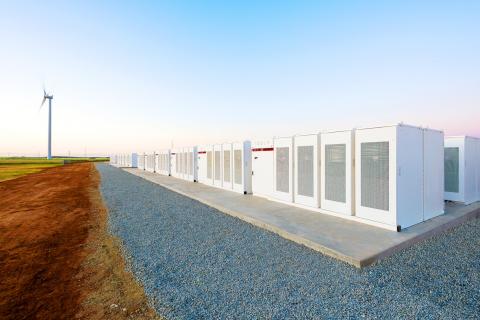Entrepreneur Elon Musk has won a US$50 million bet by beating a 100-day deadline for building a giant battery to help South Australia avoid energy blackouts, officials said.
South Australia Premier Jay Weatherill said that testing of the massive lithium ion battery would begin within days, ahead of the deadline of Friday next week that Musk set for himself when he signed off on the project earlier this year.
Musk had pledged to build the battery in the South Australian outback for free if it was not completed within the 100 days.

Photo: Reuters
He estimated that it would cost at least US$50 million — local authorities will now pick up the tab.
The entrepreneur behind electric carmaker Tesla Inc made the pledge in response to power woes in South Australia, which was last year hit by a state-wide blackout after severe winds from an “unprecedented” storm toppled transmission towers.
“South Australia is set to have back-up power in place this summer through the world’s largest lithium ion battery, which is set to be energized for the first time in the coming days as it enters a phase of regulatory testing,” Weatherill said in a statement on late Thursday.
Musk’s Tesla Powerpack is connected to a wind farm operated by French energy firm Neoen SAS and is expected to hold enough power for thousands of homes during periods of excess demand that could result in blackouts.
Australia is one of the world’s worst per capita greenhouse gas polluters, due to its heavy use of coal-fired power.
However, the nation’s proposed National Energy Guarantee program could slash investment in large-scale wind and solar projects if the government fails to boost its 2030 emissions-reduction target, a report from Bloomberg New Energy Finance (BNEF) said.
The goal of Prime Minister Malcolm Turnbull’s government to reduce emissions by 28 percent by 2030 only requires an additional 1.5 gigawatts of new large-scale renewables, according to an estimate by BNEF.
That target “could decimate large-scale wind and solar construction” while a 45 percent reduction target advocated by the opposition Labor party would “continue the current boom,” it said.
“The National Energy Guarantee could be an effective and innovative policy mechanism, but if the target is weak, it will deliver little,” BNEF’s Australian head Kobad Bhavnagri said in an email.
Turnbull’s Liberal-led coalition government was yesterday to provide information to the states in a bid to get them to back the National Energy Guarantee, which aims to bolster reliability of Australia’s faltering electricity grid.
Australia’s six states and two territories will need to approve the program for it to function properly with a meeting of the Council of Australian Governments to be held yesterday in Hobart to discuss the plan.
Additional reporting by Bloomberg

Among the rows of vibrators, rubber torsos and leather harnesses at a Chinese sex toys exhibition in Shanghai this weekend, the beginnings of an artificial intelligence (AI)-driven shift in the industry quietly pulsed. China manufactures about 70 percent of the world’s sex toys, most of it the “hardware” on display at the fair — whether that be technicolor tentacled dildos or hyper-realistic personalized silicone dolls. Yet smart toys have been rising in popularity for some time. Many major European and US brands already offer tech-enhanced products that can enable long-distance love, monitor well-being and even bring people one step closer to

Malaysia’s leader yesterday announced plans to build a massive semiconductor design park, aiming to boost the Southeast Asian nation’s role in the global chip industry. A prominent player in the semiconductor industry for decades, Malaysia accounts for an estimated 13 percent of global back-end manufacturing, according to German tech giant Bosch. Now it wants to go beyond production and emerge as a chip design powerhouse too, Malaysian Prime Minister Anwar Ibrahim said. “I am pleased to announce the largest IC (integrated circuit) Design Park in Southeast Asia, that will house world-class anchor tenants and collaborate with global companies such as Arm [Holdings PLC],”

TRANSFORMATION: Taiwan is now home to the largest Google hardware research and development center outside of the US, thanks to the nation’s economic policies President Tsai Ing-wen (蔡英文) yesterday attended an event marking the opening of Google’s second hardware research and development (R&D) office in Taiwan, which was held at New Taipei City’s Banciao District (板橋). This signals Taiwan’s transformation into the world’s largest Google hardware research and development center outside of the US, validating the nation’s economic policy in the past eight years, she said. The “five plus two” innovative industries policy, “six core strategic industries” initiative and infrastructure projects have grown the national industry and established resilient supply chains that withstood the COVID-19 pandemic, Tsai said. Taiwan has improved investment conditions of the domestic economy

Sales in the retail, and food and beverage sectors last month continued to rise, increasing 0.7 percent and 13.6 percent respectively from a year earlier, setting record highs for the month of March, the Ministry of Economic Affairs said yesterday. Sales in the wholesale sector also grew last month by 4.6 annually, mainly due to the business opportunities for emerging applications related to artificial intelligence (AI) and high-performance computing technologies, the ministry said in a report. The ministry forecast that retail, and food and beverage sales this month would retain their growth momentum as the former would benefit from Tomb Sweeping Day